There’s a very good piece by David Fellerath at Slate.com that portrays former heavyweight champion Max Baer in much more sympathetic and thorough terms than Ron Howard’s portrayal of Baer in Cinderella Man. Fellrath points out that Baer was a proud Jew who wore a prominent six-pointed star on his trunks. There’s also a star on the trunks worn by Craig Bierko, the charismatic actor who plays Baer, but it’s “significantly less prominent than the one that the real Baer wore in the 1935 fight,” writes Fellerath. “It’s no surprise that Howard would obscure this detail, as it would complicate his film’s Rocky-meets-Seabiscuit narrative.” Fellerath also notes that while Baer is depicted in the film as a guy more or less at peace with having killed a boxer named Frankie Campbell during a 1930 bout, this tragedy in fact “so rattled Baer that he lost four of his next six fights.” He also quotes Baer’s son as saying “it was after he killed Campbell that he started clowning. He started smoking cigarettes and he had nightmares for years.”
Day: June 3, 2005
Love Hurts: The Agony of “Mr. and Mrs. Smith”
Romances between immensely attractive, super-successful movie stars don’t last for all kinds of reasons. I won’t go into all the usual factors but one thing that really throws a monkeywrench into these relationships is when their children — i.e., the movies they make together — turn out badly.
The Brad Pitt and Angelina Jolie alliance is toast. I don’t actually know if they’re “with” each other and it’s none of my damn business anyway, but they’re in Mr. and Mrs. Smith together and if my observation has any validity they’re doomed as a couple because their child is a rank embarrassment…thoughtless, pointlessly prettified, emotionally neutered.
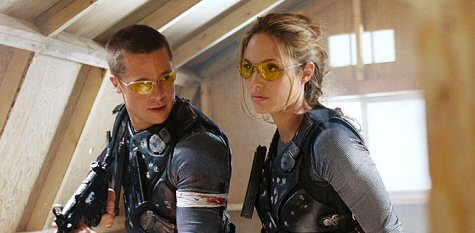
Brad Pitt, Angelina Jolie in Mr. and Mrs. Smith
It’s Charlie’s Angels 2 bad, Xanadu bad, Hook bad, Howard the Duck bad. It’s soulless, unfunny (except for some of costar Vince Vaughn’s lines), bombastic, totally sterile and inhuman. Did I leave out hateful?
I don’t want to go over the top here so let me take a breath and step back for a minute or two and collect myself. (Beat.) Okay, I’ve done that…fine. I’m calm. I’m breathing easy. This movie has cancer of the soul. It made my skin crawl.
But it’s tracking really well and 20th Century Fox is going to get a very big opening weekend out of it, and then the word will go out and the public will do whatever. I’m told that the $110 million-plus tab was fronted by New Regency Pictures so Fox probably won’t be hurt that badly.
Mr.and Mrs. Smith might even turn a modest profit. (I just winced after writing that.) I told a friend at Fox News this morning what I think and he replied, “Really? I’ve heard good word of mouth.” And the Hollywood Reporter‘s Michael Rechtshaffen is calling it “a blast” and “explosively funny.” There’s really no accounting for taste.
Rechtstaffen says that Pitt and Jolie “expertly [toss] off the type of well-sharpened banter that was the domain of Gable and Lombard and Tracy and Hepburn, [and] make one swell combative couple.” Forget the banter. The only thing these two have going for each other in this film is the fact that they’re attractive and well photographed.
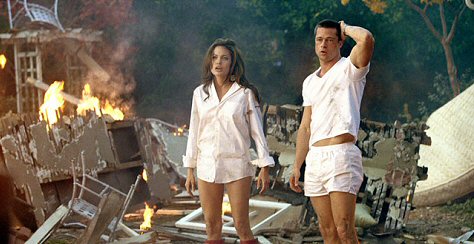
What happened here? Doug Liman, the director, is one of the hippest and brightest guys working in the big leagues right now. I’m a fan from way back (loved Swingers, adored Go, really liked The Bourne Identity) and I’m just in shock about this.
Remember that wild Las Vegas car chase in Go? Fantastic and funny, beautifully staged and edited…and there isn’t a shred of the same cleverness or whoopee humor in any of the Smith action sequences.
That Matt Damon car-chase sequence through the streets (and over the sidewalks and down the stone staircases) of Paris in The Bourne Identity? It was nearly a classic, right up there with the John Frankenheimer Paris chase sequence in Ronin…and that old Bourne magic vanishes when the Smiths hit the road.
I’m speaking of a freeway car-chase shootout in the third act that reminded me of the highly-touted freeway blastaway in The Matrix Reloaded, which wasn’t that great in retrospect.
Don’t studio execs understand that without a fresh idea or subversive attitude of some kind that sequences filled with bullets and velocity and crashing metal are numbing and infuriating, not to mention totally over?
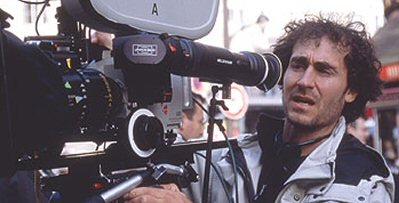
Doug Liman during shooting of The Bourne Identity.
I’m referring to the Fox and New Regency executives who rode herd on this because Mr. and Mrs. Smith feels a lot more like their film than Liman’s. I know that Liman was very precise and exacting on the set, but this movie is an almost total perversion of everything the words “a Doug Liman film” have meant to me over the last eight or nine years, so I’m figuring studio muscling had to be at least part of the equation…right?
If it wasn’t then I don’t know what to think. I’m stunned.
Ludicrous isn’t the word for the basic idea, which is that John Smith (Pitt) and his wife Jane (Jolie) are both highly skilled assassins who’ve kept their professions hidden from each other and so both are totally clueless until fate intervenes.
The only way to run with this set-up is to accept it as a metaphor. A look at a marriage gone dry in a soulless, money-obsessed culture, and how a typical fast-lane couple manages to renew their desire for each other and fall back in love again.
They accomplish this feat by trying to kill each other. It gets them hot and bothered and re-arouses their libidos.
The problem is that the metaphor isn’t developed or played with to any degree. The internals barely register. You don’t given a damn about Pitt or Jolie’s hearts or souls, much less their marriage, because the film is so invested in gloss and hardware and terrific clothes and one stupendously dull video-game action sequence after another.
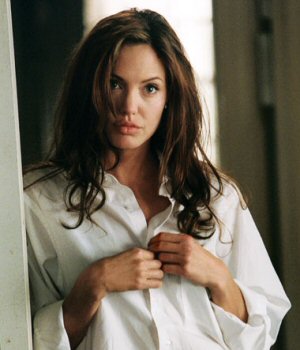
Angelina Jolie
Except, that is, for some marital-therapy sessions between Pitt and Jolie that Liman uses as bookends. (I’m guessing these were from the post-principal additional photography shoots, thrown in to humanize their relationship.) Their rapport in this footage feels loose and less constrained in a semi-improvised, Soderbergh-y way. It’s the only thing Pitt and Jolie do in this film that feels the least bit engaging.
I really can’t believe this Rechtshaffen review. He calls it “adult-skewing.” He says “it could have easily been a Hitchcock vehicle.” The “bottom line” tagline above his review says it’s “The Bourne Identity meets The War of the Roses.”
If you want a less obliging, more hard-nosed opinion, consider Todd McCarthy’s
5.29 review in Variety.
If you want a really good film about married-to-each-other assassins, go rent John Huston’s Prizzi’s Honor.
Kelly’s Return
I wrote a piece last March about Donnie Darko director Richard Kelly for the print version of Radar, which had its newsstand debut in mid May. Here’s the article off the Radar site.
Most of what I originally wrote never saw print because Radar wanted the piece tight and quick. The Radar guys are doing a good job. They’ve assembled an attractive, well-designed read, and the online component has been getting some media attention lately, but I figure it can’t hurt to run the Kelly piece in its original form:
In less than two hours, Richard Kelly’s Donnie Darko went from being the most buzzed-about new film at the 2001 Sundance Film Festival to something of a disappointment. As far as a good number of buyers and journalists sitting in the audience at Park City’s Eccles theatre were concerned, that is. Lights down, lights up…thud.
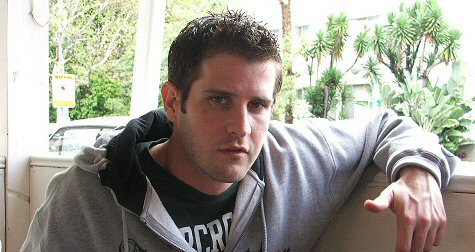
Richard Kelly, director-writer of Donnie Darko and the forthcoming Southland tales, snapped at the West Hollywood location of Le Pain Quotidien on 3.17.05
Then Darko tanked in theatres when it opened ten months later, and the 26 year-old Kelly (just four years out of USC film school) began his jail sentence in hell.
“I went into a long period of depression,” he says. “2001 was a pretty miserable year. 2002 was nearly as bad. I felt like my career was sliding off the edge of the coast.”
Darko is about a schizophrenic high school kid (Jake Gyllenhaal) who sees into the future while coping with the attentions of a tall phantom rabbit with silver teeth. It gets the loneliness of being a smart perceptive kid living on his own wavelength…which is probably why (eureka!) Darko eventually caught on as an under-30 cult flick. (The DVD has made $10 million, and the director’s cut, re-released into theatres last summer and out on DVD last February, has taken in about $4.7 million.)
Sometime last fall, after three years of being a what’s-your-name-again? director whose projects couldn’t get financing, the fog lifted.
The word got around that Kelly had a pulse again because his script for Domino (New Line, 8.3) — a smartly aggressive action piece that Tony Scott was directing about the real-life Domino Harvey (Keira Knightley), a Beverly Hills model who became a bounty hunter — whupped ass.
It also began to seep through that Kelly’s long-planned Southland Tales — a futuristic, darkly comic, vaguely musical L.A. fantasia — had solved its funding problems and was preparing to shoot in July.
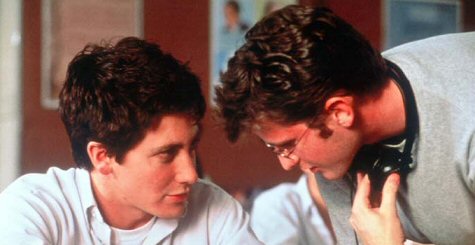
Darko star Jake Gyllenhaal, Kelly during filming in ’00.
It was Darko`s dispiriting reception that led Kelly to write Southland Tales “at the height of my depression,” in the spring and summer of ’01. It was about anger and frustration, but also wanting to put together “something really epic, a big tapestry about Los Angeles…given my state of mind at the time, it was bound to be subversive.”
Scott (Man on Fire, Top Gun) became a fan of Tales after reading it in ’02, and translated this enthusiasm into an insistence that Kelly write the Domino script.
Getting this gig “certainly helped my career,” says Kelly, but the tide really turned when a British distribution executive named Ben Roberts, who had distributed Darko in the U.K. before getting hired to run Universal International, “fought really hard” to persuade Universal Pictures to greenlight Southland Tales for $15 million.
A key reason Tales was able to get rolling, according to Kelly’s producer Scott McKittrick, was the commitment of actors like Dwayne Johnson (a.k.a., “the Rock”), Seann William Scott and Sara Michelle Gellar to lower their fees, which was largely about their admiration for Darko.
Kevin Smith, who did the voice-over commentary with Kelly on the Darko DVD, is playing a legless Iraqi War veteran.
Tales is set in Los Angeles of 2008, over the 4th of July weekend. It’s partly about the loneliness of life in L.A. and trying to hustle a living in the entertainment industry, and partly about coming political chaos — the action occurs in the wake of political hysteria that has turned the country into an ultra-surveilled police state.
Kelly says some of the music will be composed by Moby. (The film’s website has a quote from Perry Farrell, which seems to indicate he’s also part of the mix.) He also warns against anyone looking for any kind of traditional break-into-song scheme.
“If you don’t like musicals there’s no way this will fall into the category of offense,” he says. “When people see it they’ll go `Hmm…that’s subtle.’ In the end, I may be the only human being on earth who actually considers it to be a musical.”

An early visualization of the police-state atmosphere in Southland Tales.
Kelly, who turned 30 on 3.28, is Irish-looking — fair skin, freckles — and has an easy-going manner. He calls himself “an aging frat guy who likes to go out and have a good time.” But when he puts on his filmmaker’s cap he becomes the Sorcerer’s Apprentice and a different mentality comes through.
It’s not like Kelly is against commercial films, but so far the indications are that he’s into satiric, subversive, sci-fi mindblower-type stuff …and come what will of it. His current passion is for Philip K. Dick (the author of “Blade Runner” and “I Can Remember It For You Wholesale,” which became Total Recall) and, as Southland Tales shows, the whole illuminate-the-present-by-showing-a-twisted-future thing.
The son of a NASA engineer, Kelly was born and raised near Richmond, Virginia. His talent at drawing and painting got him into art studies at USC, but he transferred to film studies when art courses drove him crazy.
Kelly might be lonely and a bit of a dweeb at heart (like all writers…don’t get him started on women). He talks like a grounded adult and seems to know about focus and discipline. But ask him a question and he digresses and meanders. (You have to keep going back and ask it repeatedly — he’ll eventually cough up an answer.)
Becoming famous “has certainly helped me get more dates with women,” he comments. “All the sorority girls at USC thought I was interesting but kind of dark and weird. They were more into the guys from Orange County who were going to be stockbrokers. I got made fun of a lot for being a cinema student, and after a while it started to get to me. I started to doubt myself, and writing Darko was my response to that self-doubt.
Kelly isn’t all about ominous heavy-osity. He once made an “aggressively stupid” frat-boy movie in film school — a Super 8 effort called The Vomiteer.
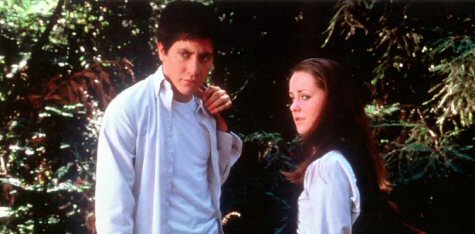
Jake Gyllenhaal, Jena Malone in Donnie Darko
“It was just me being an idiot frat guy with a fraternity brother…being that guy, a guy who can’t stop vomiting, and he’s isolated because of that. It was a ridiculously stupid short film…it was basically about me trying stage to really good puke scenes. We found different ways of using the hose and having it come out of his mouth.”
But his next student film, The Goodbye Place, was more serious and ambitiously filmed, and when it was done and shown to his fellow students, Kelly knew (or at least began to believe) that he had the makings of real filmmaker.
USC’s film school “is a very cutthroat environment,” he recalls. “If your film sucks, you’re going to hear that. Everyone goes to USC thinking they’re going to be the next George Lucas, and when they get there they realize it’s a lot harder. But after I showed this film at the end of my junior year, I got an overwhelming feedback. The instructors were giving me pats on the back.”
Kelly’s favorite films of all time, he says, are two Kubricks — 2001: A Space Odyssey and “the masterpiece, one of the most profound films ever made,” Barry Lyndon.
Kelly’s most recent gun-for-hire gig was writing a screenplay for a $100 million, special-effects-heavy World War II film about the sinking of the USS Indianapolis, based on Doug Stanton’s “In Harm’s Way.”
The Warner Bros. production would be about the torpedoing of the famed U.S. destroyer in July 1945, as well as the horrible five-day ordeal that roughly 900 sailors went through in the water while waiting to be rescued. Over 300 were eaten by sharks, and only 317 survived. Kelly calls it “the tightest thing I’ve ever written.”

Painting depicting the rescue of the survivors of the sinking of the U.S.S. Indianapolis in July, 1945.
Because of the 317 men who lived, Kelly has titled his WWII script Optimistic. Does this suggest a basic philosophy? There’s a temptation to presume that.
Attention: For a taste of the mood and some of the musical inclinations of Southland Tales, check out the very cool website that Kelly has been developing and constantly adding to over the last few months.
Batman Shutout
Devin Gordon’s recent, very glowing Newsweek article got me excited about seeing Chris Nolan’s Batman Begins (Warner Bros., 6.15), and then I was invited to see it last night (Thursday, 6.2) at 7 pm.
But my friend at Warner Bros. assumed I knew where the screening room was and I didn’t, and I couldn’t find the damn thing and now I’ll have to wait until Monday night’s showing.
First I went to the old Warner Bros. headquarters at 75 Rockefeller Plaza, which is where Warner Bros. used to have a screening room when I was living here and starting out 25 years ago. No go, and the guy at the desk didn’t have a clue where it might be.

The bicycle rickshaw guy who peddled me over to Columbus Circle, taken on our way up Sixth Avenue — Thursday, 6.2.05, 7:12 pm.
I kept asking and pleading, and then another lobby security guy in a blue sports jacket finally said, “Columbus Circle!”
It was 7:05 pm…shit! I sprinted over to Sixth Ave. but there were no cabs, so I took one of those coolie bicycle cabs — 20 bills! — up Sixth and over to Columbus Circle, and it was kinda cool riding in one of those things. These coolie cabs can really maneuver around traffic and make good time. But I felt badly for the driver when we hit the slight uphill grade going west on Central Park South. The poor guy was huffing and puffing and sweating like a dog.
The guy dropped me off and I finally found the Warner headquarters on the side of the building but again, no go. Screening? Who? Batman? What?
By this time it was 7:25 pm and I knew the game was over. As I stood in the lobby Larry King walked in and some well-tended middle-aged woman came up to him and went “Lahrry!” and gave him a hug and an air-kiss. This only made me feel worse, for some reason.
I walked outside and sat down on some kind of shiny knee-high chrome sculpture…dejected, depressed and faintly pissed.
And So It Starts
A guy named Chuck Rudolph wrote Wednesday with a beef about my Cinderella Man review, and I responded to him point for point. Here’s how it went down:
“I just read your piece on Cinderella Man shortly after reading a review by one of the best critics out there (and one on your temp turf), Matt Seitz of the New York Press.
“I thought your piece did a fair job of summing up what you found to be the film’s perks without grandstanding or overselling, yet I couldn’t help but wonder why you seemed content to skim the surface and never get into the real meat of the film.
“Cinderella Man is obviously going to be considered a serious film by a lot of people, so why not treat it as such with a sharper review?”
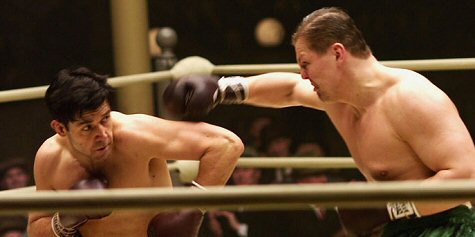
Russell Crowe (left) as Jim Braddock in Cinderella Man.
Wells to Rudolph: I got into the meat that is there, as presented and assembled by Howard. I don’t think he made a feel-good movie about the Depression. I think he made a movie about a guy who got focused and motivated by life kicking him and his family in the ass. I relate to this. This is how it works sometimes. This is how it worked with Jim Braddock.
Ron Howard’s films will always be indictable for attempting to stir the emotions in ways that are not in synch with the aesthetics of raw unvarnished realism. Matt isn’t wrong in saying what he’s said, but it’s just a way of looking at this thing. It’s not the only way. You should go to see it before spouting off.
Rudolph: You write that Braddock lucked into his underdog run…
Wells: He did, pretty much.
Rudolph: “And that suggests his second chance at a boxing career ran no deeper than such.”
Wells: As Tennessee Williams once wrote, “Sometimes there’s God…so quickly!”
Rudolph: “You go on about the performances (and you’re probably right about Giamatti), but you seem disinterested in the nature of the characters that are being performed and what they represent in the film’s scheme. (Paddy Considine is of so little importance his character is really called “friend-of-Jim Braddock”?)
Wells: Considine’s character is a representation of the leftist social ferment that was brewing back then. Big fucking deal. It’s okay that he’s there, it’s another thread in the weave, but I’m not going to disgress into a big political thing because of this character.
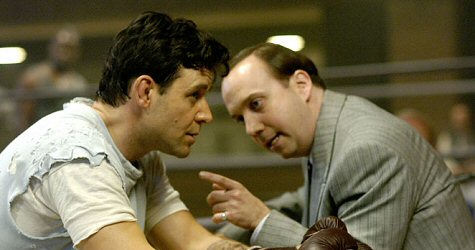
Rudolph: Overall you seem to be playing down the fact that this is a Ron Howard movie (‘a few Ron Howard-y touches here and there, but not so you’d really notice’) because you know what that entails but you fell for it anyway: manipulative bullshit.
Wells: It’s manipulative, but it’s not bullshit. It is recognizably real in terms of facts, emotionality, behavior. The story is based on truth.
Rudolph: “I may be oversimplifying but as someone who through experience has come to more or less believe in the auteur theory (by way of Truffaut, recently reprinted in the Jules and Jim DVD), and the statement that ‘I don’t believe in good and bad films. I believe in good and bad directors.’ There’s nothing in your piece that indicates, no matter how much you want to talk about Howard not pushing the buttons too much, that this is anything other than a Ron Howard movie, i.e. a movie that glosses over facts and ignores reality in order to make his subject more audience-friendly.”
Wells: I don’t doubt that Howard has ignored something (or some things) in Braddock’s story. And so fucking what? Everybody cuts and prunes and shapes in order to achieve the end that they’re after. Elia Kazan chopped out two thirds of Steinbeck’s East of Eden to make the movie that he made. Does that mean he’s a manipulative bullshitter?
Rudolph: “Who cares about the emotional buttons when Howard so easily manipulates deeper themes to sell his audience lies about themselves and this country?”
Wells: Howard will always sugar-coat (but not as much as he used to) and romanticize and fiddle around with things in order to make what he wants to come out, come out. This is not a criminal offense.
Rudolph: “Maybe you think he does a good job of examining the social conditions of Braddock’s life and makes a fair case for him as an honest underdog champion, but then why not talk about it in your review?”
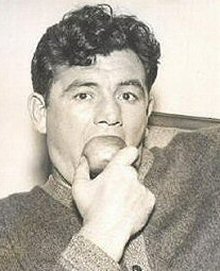
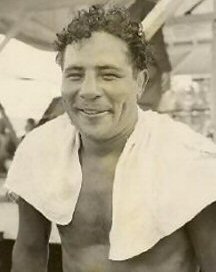
The real Jim Braddock (left) and Max Baer, in snaps taken sometime around 1934 or ’35 or thereabouts.
Wells: He does a fairly decent job of depicting the social conditions. It didn’t seem deceptive or dishonest to me. I recognized the Depression milieu he created as more or less the same Depression milieu I’ve been absorbing through books, movies, articles and documentaries since I was ten or twelve years old. I used to hate Ron Howard and his overly massaged and commercial approach to moviemaking, but he’s a much better, significantly more honest filmmaker now. He’s not making Far and Away here.
Rudolph: “What’s sticks out to me in Seitz’s review is the line ‘the movie encourages us (just as the Depression-era media encouraged fight fans) to view Braddock as an emblem of the common man’s aspirations.’ What that’s saying is that Howard is hustling audiences with this movie just like fight promoters hustled crowds back during the Depression.
Wells: Is Matt saying that the people who identified with Braddock and fell for the come-from-behind legend were being sold a bill of goods and were suckers? That the real Braddock story was…what?….less difficult or more layered than the ones we’re shown in the film, or the one that was conveyed to the masses by newspaper writers back in the early to mid ’30s? If this is the case, okay. The reality probably was blurred to some extent. But this doesn’t invalidate the central theme of the film, which is that when life puts your feet to the fire and really clobbers you two or three times, you can either get going and fight back…or you can fold your tent and become a drunk or whatever.
Rudolph: I would hope that a contemporary film about this subject would have the intelligence to at the very least acknowledge this symmetry, but knowing Howard’s track record it seems doubtful that Seitz is off-base here, and your review more or less confirms that for me — the film didn’t have you looking any deeper than the superficiality Howard was shoving down your throat, and that you’re praising him for doing it in such a mild-mannered fashion only speaks to the insidiousness of his touch. You sound like one of the people who got hustled, and you’re happy about it.
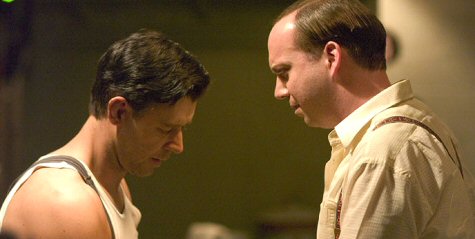
Russell Crowe as the legendary Jim Braddock, Paul Giamatti as his manager Joe Gould in Ron Howard’s Cinderella Man.
Wells: I am content that what Howard showed me was a reasonable facsimile of life (and particular lives) back then. I recognized what I saw as a reasonably accurate depiction of a lot of things, both sociologically specific and metaphorical and spiritual and what-have-you. I don’t feel the hate about this film that I’ve felt about Howard’s films in the past. I hate crapola in all its forms. I don’t feel this way about Cinderella Man.
Rudolph: “I guess I’m just disappointed that you seemed to have been suckered by the film. Your nose for bullshit is usually pretty strong and you not too long ago even coined the incredibly perceptive term “ape cage” in your ’05 preview (which my friends and I have been using ever since to describe movies like, well, Cinderella Man)…but this review makes it sound like you’ve fallen into that very demographic.”
Wells: It’s a stirring, compassionate film. It does not shovel what I could call bullshit. It massages things to tell a kind of truth that has a basic validity. Ron Howard and Ken Loach live on different planets. Frankly? I like the post-Apollo 13 Howard for his filmmaking chops and tendencies better than I do Loach.
I know — that makes me an idiot. But Ken Loach is not God. He’s just a middle-aged British guy who feels and sees things a certain way, and has drawn certain conclusions and put them into his films. Fine. That doesn’t make him the Dalai Lama.

No explanation or relation to anything in today’s column, but this happens to be one of the more alluring snaps I’ve ever taken. And not just that. I can seriously see this photo hanging on a gallery wall some day. It’s got something. Maybe because it was taken in a kitchen.

Interior of the Brooklyn-based office of Hollywood Elsewhere — Tuesday, 5.31, 4:40 pm.
